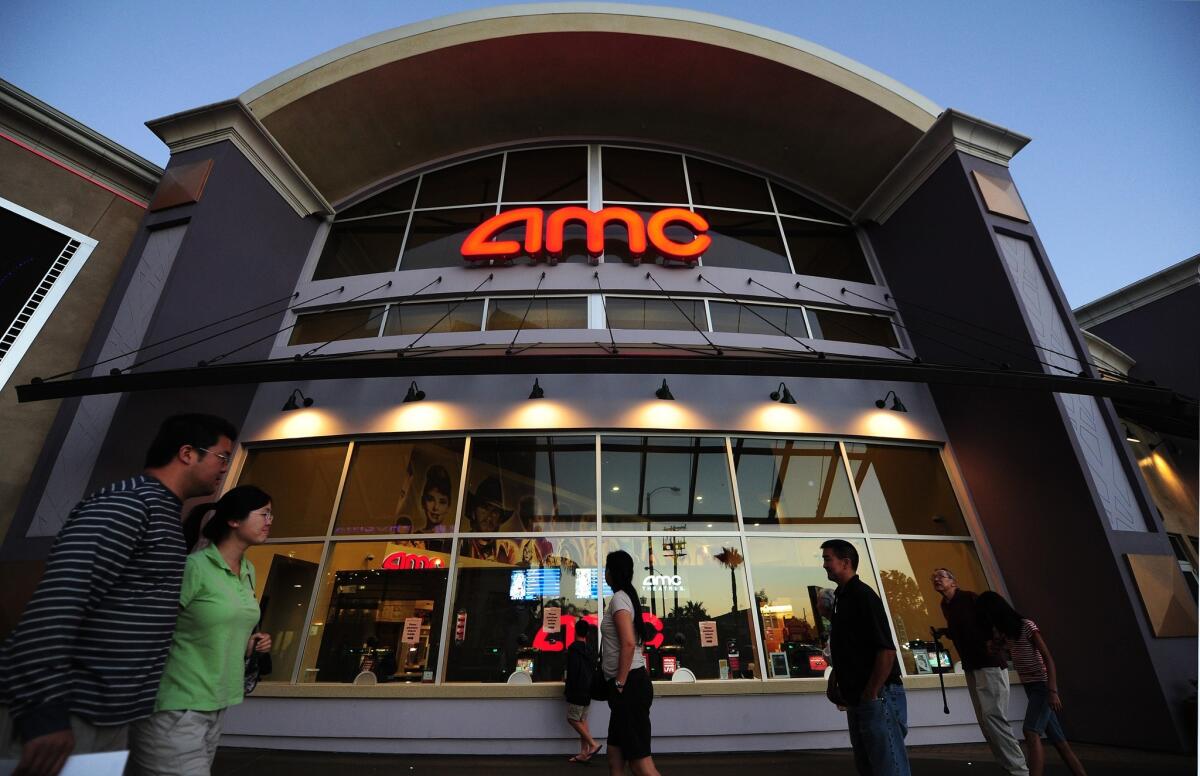AMC’s Carmike bid extends Hollywood influence of China’s richest man, Wang Jianlin

Shown is an AMC Theatres location in Monterey Park, east of downtown Los Angeles.
- Share via
Movie theater chain AMC Entertainment’s proposed $1.1-billion acquisition of Carmike Cinemas is the latest deal to significantly extend the Hollywood influence of China’s richest man, Wang Jianlin.
The move would give the 61-year-old billionaire’s conglomerate Dalian Wanda Group, which owns AMC, control over the biggest theater chain in the U.S., furthering Wang’s ambition to be a power player in the global entertainment industry.
Adding Carmike also could give the company additional clout in the sometimes contentious negotiations with studios over revenue splits for movies, analysts said.
See more of Entertainment’s top stories on Facebook >>
The development comes just two months after Wanda said it would pay $3.5 billion for Burbank production company Legendary Entertainment, known for backing blockbusters including “The Dark Knight” and “Jurassic World.” Wanda, a giant in the real estate and media businesses, is also considered a potential bidder for part of Viacom Inc.’s Paramount Pictures or another U.S. studio.
“Certainly, Wanda’s influence over the market increases with this deal,” said Eric Handler, a media analyst at MKM Partners. “Wanda believes in scale, and you see them making a lot of acquisitions. And I think that’s also part of AMC’s business plan.”
Wanda, which owns China’s leading movie chain, became the world’s largest cinema operator in 2012 when it bought AMC for $2.6 billion.
Leawood, Kan.-based AMC is the second-ranked U.S. theater operator, with 387 locations and 5,426 screens. If the Carmike agreement closes as planned at the end of this year, it would surpass Regal Entertainment Group as the nation’s top chain, bringing its reach to well more than 600 cinemas. Carmike is the country’s fourth-largest exhibitor, with 276 theaters and 2,954 screens.
Wanda believes in scale, and you see them making a lot of acquisitions. And I think that’s also part of AMC’s business plan.
— Eric Handler, media analyst at MKM Partners
Wanda has been on a deal-making spree. The company said last month that it will invest $3.3 billion in EuropaCity, an entertainment and retail complex near Paris.
“It certainly is a piece of Wanda’s global ambitions in the entertainment industry, but also in the real estate market,” said Lindsay Conner, an entertainment industry lawyer and partner in Manatt, Phelps & Phillips. “This [AMC] deal satisfies Wanda’s corporate goal and Wang’s personal goal to be the No. 1 theater business in the U.S., as they are in China.”
Under the agreement announced Thursday, AMC would pay $30 a share in cash for Columbus, Ga.-based Carmike and assume debt. Wall Street cheered the deal. AMC’s shares rose $1.32, or 5%, to $27.02 on Friday, while Carmike’s stock soared 16% to $29.25.
Still, the offer may have undervalued Carmike, given the company’s sway in smaller, regional markets, said B. Riley analyst Eric Wold. AMC’s announcement could spark competing bids from Regal and No. 3 exhibitor Cinemark, he said.
“AMC is getting a bargain on an attractive asset,” Wold said. “The question is going to be, did Carmike shop this around already?”
The proposed tie-up is the latest example of consolidation in the movie theater industry. Carmike recently bought Robert Redford’s Sundance Cinemas for $36 million in a deal encompassing five theaters, including the Sundance Sunset in West Hollywood. AMC last year took over 33-theater Starplex Cinemas in a deal worth $172 million. In 2013, Regal acquired Hollywood Theaters, a Portland, Ore., chain that operates 43 theaters in 16 states, for $191 million in cash and about $47 million in assumed lease obligations.
The concentration of the theater business comes at a time when exhibitors face long-term stagnation in attendance. Though the industry is coming off a record year at the box office, exhibitors continue to grapple with competition from other entertainment options, including streaming Internet video. Another problem is that the big Hollywood film companies are making fewer movies and focusing their efforts on their well-known franchises, forcing theater owners to increasingly rely on a few mega-hits a year to drive sales.
And unlike China’s cinema industry, the U.S. theater business isn’t building many new locations. Wold estimates the U.S. screen count has increased just 3% in the last decade.
“The problem is, domestically, there’s no growth opportunity,” Wold said. “If you want to get scale and efficiency, you need to buy someone else.”
In recent years, major chains such as AMC have invested heavily in renovating and refurbishing their multiplexes with features such as upscale food, reclining seats and new sound and digital equipment to entice moviegoers. AMC is expected to make improvements to Carmike’s theaters.
The deal would extend AMC’s reach in smaller towns, suburban areas and rural regions where Carmike is a powerful player. AMC’s influence, meanwhile, is mainly concentrated in major cities.
“Wherever you go, this deal is complementary,” said AMC Chief Executive Adam Aron in an interview. “We’re strong in large cities, they’re strong in smaller cities. We’re strong in the Northeast, and they’re strong in the Southeast. The addition of Carmike increases our scale and our scope and allows us to take the successes we’ve had and extend them to these additional theaters.”
The proposed pact is likely to face scrutiny from federal antitrust regulators, and analysts expect the combined company to divest some of its theaters in order to pass muster. The Justice Department last year ramped up an investigation into whether theater owners are violating federal law by preventing smaller rivals from playing movies at the same time.
More to Read
From the Oscars to the Emmys.
Get the Envelope newsletter for exclusive awards season coverage, behind-the-scenes stories from the Envelope podcast and columnist Glenn Whipp’s must-read analysis.
You may occasionally receive promotional content from the Los Angeles Times.















































